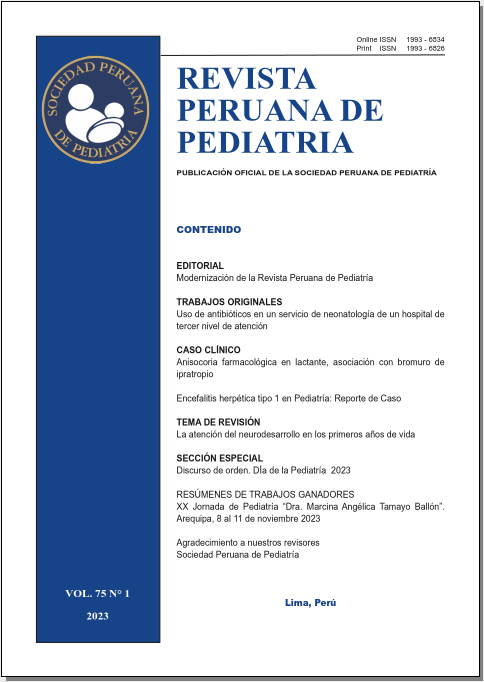Type 1 herpetic encephalitis in pediatrics: case report
DOI:
https://doi.org/10.61651/rped.2023v75n1p2c1-2c6Keywords:
Encephalitis, Herpesvirus 1, HumanAbstract
Herpetic Encephalitis is a severe infectious disease of the central nervous system (CNS); and it is caused almost exclusively by Herpes simplex virus type 1. Suspicion and early treatment with Acyclovir improves the prognosis, otherwise there is a mortality of up to 70% and those who survive are left with serious sequelae (1).
In older children and adolescents, and due to temporal lobe involvement, encephalitis may present with fever, psychiatric symptoms, emotional lability, movement disorder, ataxia, seizures, stupor, lethargy, coma, or localized neurologic changes (hemiparesis), cranial nerve defect). In severe cases, status epilepticus, cerebral edema, syndrome of inappropriate antidiuretic hormone secretion (SIADH), and/or cardiorespiratory failure may occur (2).
Sequelae among survivors are significant and depend on the age and neurological status of the patient at the time of diagnosis (3).
The gold standard to establish the diagnosis is the detection of herpes simplex virus DNA in cerebrospinal fluid (CSF) by polymerase chain reaction (PCR), of the fluid obtained after lumbar puncture (4).
Incidentally, a case of herpetic encephalitis in a schoolboy is presented; who attends due to acute presentation of intense headache, fever, vomiting, seizures and loss of consciousness; with confirmation of Herpes Simplex virus in CSF Filmaray and subsequent favorable response to antiviral treatment and survival, but with extensive temporal lobe injury.
Downloads
Downloads
Published
How to Cite
Issue
Section
Categories
License
Copyright (c) 2023 Maria Jesus Noriega Caceres, Edwin Lazo Rivera

This work is licensed under a Creative Commons Attribution 4.0 International License.
Authors will retain the copyright and grant the right to publish their work in the journal while allowing third parties to share it under the Creative Commons Attribution license.
Articles are published under a Creative Commons license that allows sharing and adaptation with appropriate credit. CC BY 4.0 license. Available in English at https://creativecommons.org/licenses/by/4.0/
Authors may use other information disclosure formats as long as the initial publication in the journal is cited. The dissemination of the work through the Internet is recommended to increase citations and promote academic exchanges.
The published content does not necessarily reflect the specific point of view of the journal, and the authors assume full responsibility for the content of their article.




